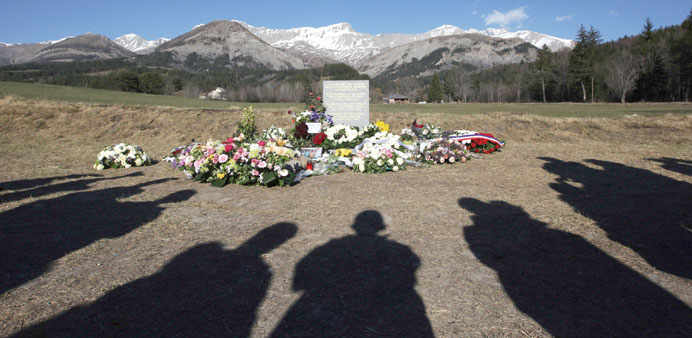This April 6 file picture shows members of the media standing near a stela commemorating the victims of the March 24 Germanwings Airbus A320 crash in the village of Le Vernet, southeastern France, after a ceremony with victims’ relatives. Lufthansa said yesterday that it has offered compensation of €25,000 ($27,958) to the families of the German passengers who died in the crash.
Reuters/AFP
Berlin
Germanwings is offering €25,000 ($27,958) compensation payments to close relatives of those killed in the March 24 plane crash for their pain and suffering, it said yesterday.
Evidence shows co-pilot Andreas Lubitz locked the captain out of the cockpit of Germanwings flight 4U9525 from Barcelona to Duesseldorf and deliberately steered the plane into a remote mountainside, killing all 150 onboard.
The €25,000 payouts are on top of €50,000 already paid as immediate financial assistance to relatives.
German law does not usually provide for a separate award for pain and suffering, unlike in the United States.
Germanwings, a unit of Lufthansa, said yesterday that it wished to treat everyone fairly, although one lawyer said the offer was not sufficient.
The damages payout for emotional distress will be made to parents, widowed spouses, partners and children of the victims and does not require proof of damages incurred to be presented in order for the payout to be made, it said.
Close relatives living in Germany may also claim an additional €10,000 each as compensation for any health problems without needing to offer formal proof, the company said.
Families of the victims still have the right to make further claims for other financial costs, such as burial costs or lost pensions, although this will require proof of damages incurred.
A lawyer representing some of the German victims, Elmar Giemulla, described the offer as “completely inadequate”, noting pilots’ strikes last year had cost Lufthansa around €200mn while the offer of €25,000 for the relatives would cost the airline around €7.5mn.
Lufthansa said in response it had looked at similar cases and its offer went beyond those.
Separately, a German task force set up to review cockpit door security and pilot screening after the crash said airlines should strengthen employee assistance services that allow crewmembers to report their own problems or report any concerns about colleagues’ mental health.
Airline bosses said at a meeting in Miami this month that crew members keeping an eye out for their colleagues could be an effective way to bring any issues to light.
The task force will report its findings to European and international authorities. It said it would recommend to European authorities that such employee assistance services be made mandatory.
The EU’s own task force is due to produce a report with recommendations by the end of July. The European Commission will then decide whether to alter safety rules.
The panel – made up of German airlines, aviation bodies, unions and government officials – also supported a rule introduced by many airlines after the crash for two staff members to be in the cockpit at all times.
Since the disaster, it has emerged that Lubitz had seen seven doctors in the previous month.
Lubitz, who suffered from “psychosis”, was terrified of losing his sight and consulted 41 different doctors in the past five years, including general practitioners, psychiatrists and ear, throat and nose specialists.
Several of these doctors who were questioned by German investigators said Lubitz complained he had only 30% vision, saw flashes of light and suffered such crippling anxiety he could barely sleep.
Lubitz reportedly said “life has no sense with this loss of vision”.
However, the doctors he consulted – including one who booked him off work two days before the ill-fated flight – did not reveal his mental struggles due to doctor-patient privilege.
Lubitz was quietly buried last Saturday in his hometown of Montabaur in western Germany, reported the local daily Rhein-Zeitung.

